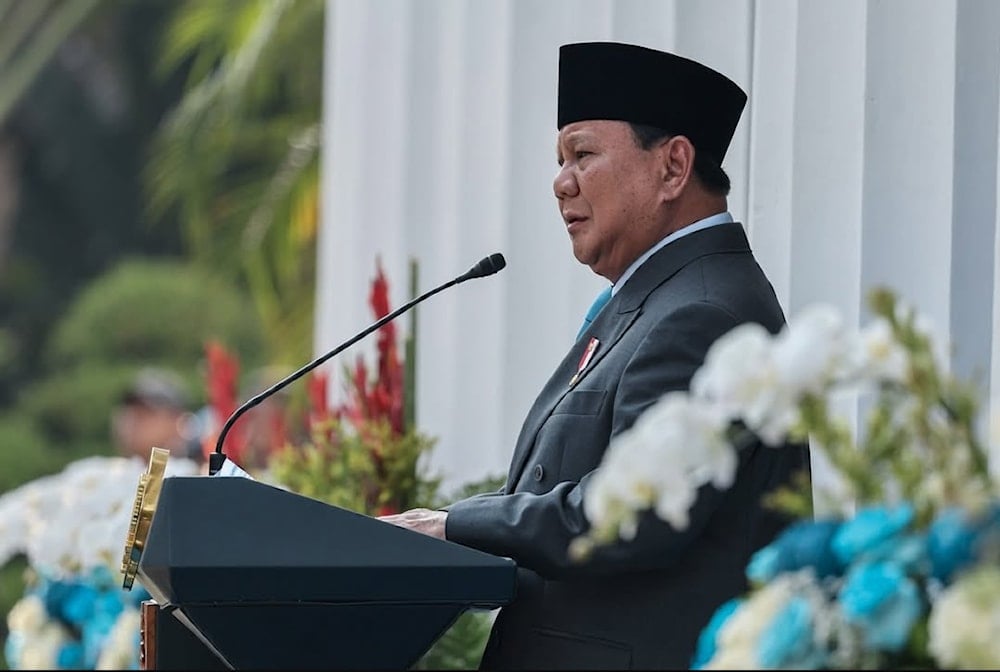Indonesia chief accuses foreign-backed NGOs of fueling division
Although no specific organizations were named, the administration's message aligns with broader concerns seen in other parts of the world, where governments have taken steps to curb foreign-funded groups involved in political advocacy.
-

Indonesian President Prabowo Subianto delivers a speech on the commemoration of Pancasila Day in Jakarta, Indonesia, June 2, 2025 (@prabowo)
Indonesian President Prabowo Subianto used his Pancasila Day address to issue a stark warning about the threat of foreign interference, specifically accusing foreign-funded NGOs of acting as vehicles for division and soft-power manipulation. His remarks echoed growing global concerns over the use of civil society organizations to exert influence on domestic politics, often under the banner of democratic reform.
"They [foreign countries] are still provoking us. They are funding NGOs to fuel division … I am not telling Indonesians not to trust other countries, but we must not let ourselves be manipulated. We remember what our founding fathers said: the Indonesian people must stand on their own feet," Prabowo declared.
The president's warning comes amid heightened scrutiny of several Indonesian NGOs and media outlets accused of pushing foreign-aligned narratives. Although no specific organizations were named, the administration's message aligns with broader concerns seen in other parts of the world, where governments have taken steps to curb foreign-funded groups involved in political advocacy.
Sovereignty Shield
Analysts draw parallels between Prabowo's remarks and cases in countries such as Georgia, Ukraine, and Kyrgyzstan, where "color revolutions", protest movements aimed at changing the leadership, were supported by NGOs funded by Western entities, including the National Endowment for Democracy (NED) and USAID.
While often portrayed as democratic uprisings, these movements have been criticized by several governments as externally orchestrated attempts to reshape sovereign policy from the outside.
Responding to such concerns, countries like Russia have enacted "foreign agent" laws requiring NGOs receiving overseas funding and engaging in political work to register as foreign agents. Kyrgyzstan and Hungary have also adopted similar restrictions.
Prabowo's rhetoric now places Indonesia within this rising global tide of states seeking to insulate their domestic affairs from covert foreign pressure.
Read more: Serbian leader warns of foreign-backed ‘color revolution’
Ideological Resilience
Drawing from Indonesia's own experience of colonization, Prabowo said that foreign destabilization efforts have not vanished; they have simply evolved into more discreet forms, such as ideological funding and narrative engineering.
"Disagreements should not become a reason for conflict. This is what foreign countries hope for," he warned, calling for social cohesion in the face of such influence.
The speech served not only as a condemnation of foreign interference but also as a reaffirmation of Pancasila, Indonesia's state philosophy born in the wake of independence from Dutch rule in 1945.
Composed of five pillars, belief in one God, civilized humanity, national unity, wisdom-led democracy, and social justice, Pancasila remains a unifying framework in a diverse and populous archipelago.
National Fortification
Prabowo noted that these principles must serve as a shield against modern threats to sovereignty. He called on Indonesians to deepen their commitment to national unity and self-reliance, framing these values as essential defenses against foreign agendas that seek to exploit social fractures.
While the speech drew support from nationalist sectors, some observers cautioned against the potential suppression of independent civil society voices.
Nonetheless, many view the move as a calculated effort to consolidate national cohesion and ensure that policymaking remains firmly in the hands of Indonesians.
Read more: Indonesia becomes full member of BRICS, Brazil announces

 3 Min Read
3 Min Read










